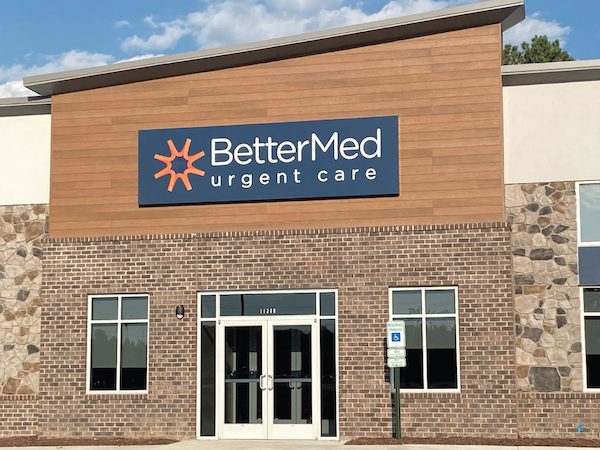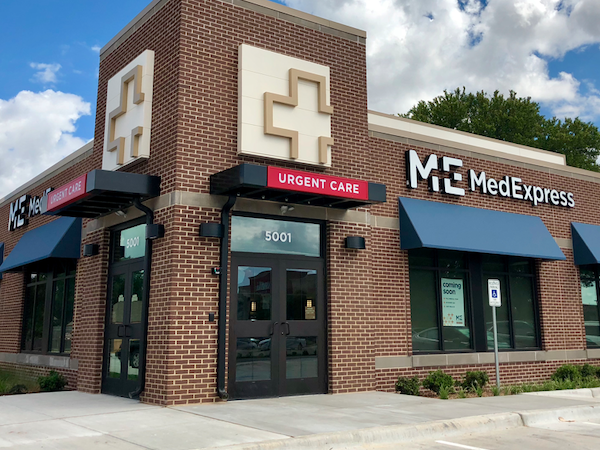
BetterMed pivoted to coronavirus testing at some of its urgent care centers in the Richmond area. (Courtesy BetterMed)
Not even health care is totally safe from the economic disruptions of the coronavirus pandemic, as Richmond-area urgent care providers juggle the regular business of urgent care with operation of COVID-19 testing centers.
Several local urgent care chains have reallocated staff, resources and facilities to provide testing services amid a larger effort by government and health officials nationwide to come to grips with the extent of virus infections.
BetterMed, which operates 12 centers in Virginia and North Carolina, had come off of growth in the last quarter of 2019, having opened three new locations. When the pandemic struck, the company had a decline in patients, said CEO Mark Johnson, speculating that people who may have otherwise paid a visit to a center didn’t to avoid potential exposure to the virus.
Business dropped off so much that Johnson and other company leaders looked at costs and where they could cut in order to survive. They hit on coronavirus testing and related examinations as a way to generate revenue and keep people employed, and rolled out the service in March.
“It was a bit of a tense time for us,” Johnson said. “We decided to jump in and provide a community need.”
Four of BetterMed’s eight Richmond-area centers currently are devoted to curbside testing and exams. The tests determine the presence of coronavirus, while the exams are essentially check-ups. BetterMed said it has tested about 16,000 people in Virginia. The service is available regardless of whether the patient has coronavirus symptoms.
“We need to understand what condition patients are in and testing is only one part of that,” Johnson said.
Patients make appointments online and pay for the service. The total cost of the service can vary, but a Virginian who pays out of pocket can expect to shell out $149 for the exam and about $50 to $100 for the lab costs to cover a PCR test, which determines whether a person is infected with COVID-19. BetterMed also offers antibody tests, which determine whether a person ever has been infected with COVID-19.
Test centers only conduct testing and often have larger teams working at them than they did pre-pandemic. The company has been able to cover staffing by reducing hours at centers that still offer urgent care services. BetterMed employees also have volunteered in state health department efforts to do free testing in low-income areas.
Johnson expected revenue during the period would be about equal to what BetterMed earns under normal circumstances.
BetterMed has been reporting its testing results to the state health department and has worked closely with state officials as it has begun testing. As with other organizations in the healthcare industry, getting supplies has been a persistent challenge. But Johnson said he was pleased with the supply network the company has developed through quick reactions to tips, and constant networking and phone calls.
BetterMed isn’t the only urgent care company to offer coronavirus testing.
MedExpress offers testing

A MedExpress urgent center center located in Texas. The company has rolled out coronavirus testing in Richmond and other markets. (Courtesy MedExpress)
MedExpress, a national urgent care company with 250 centers in 19 states, began to offer coronavirus testing at about 100 of its locations in March. MedExpress has three Richmond-area locations, and one offers curbside testing, according to the company’s website.
Like BetterMed, MedExpress has designated certain facilities as testing centers only, while other centers continue to offer urgent care treatment.
“This allows us to ensure that we have the appropriate personal protective equipment, staffing, and protocols in place to provide various types of care and services, as needed, to the Richmond community,” MedExpress spokeswoman Olivia Serdy said in an email.
MedExpress doesn’t plan to open new testing facilities in the Richmond area at this time. Serdy declined to share how many people the company has tested in Virginia and didn’t respond to a question about how the pandemic had affected the company’s bottom line.
Drive-up testing
Patient First, which is based in Richmond, began to conduct testing in mid-April. Locally, drive-up testing is available by appointment at four centers in the area, Patient First spokesman Ian Slinkman said in an email.
“There has been significant interest in COVID-19 testing from our patients, as well as from government and healthcare authorities. We are glad to be a resource for that service,” he said.
Slinkman declined to discuss financial impacts of the pandemic on Patient First. The company has started to offer telehealth services for patients who have visited a center in the last five years. Patient First had tested about 5,500 people in Virginia as of early May.
Both government and private entities are engaged in coronavirus testing, and it’s an effort that’s increased since the pandemic struck. The state provides free testing through the Division of Consolidated Laboratory Services, the state’s public health lab, for symptomatic people who are underinsured or uninsured. The VDH reported a total of about 29,000 cases and about 196,000 tests administered in the state, of which about 177,000 are PCR tests, according to the agency’s website Friday.
“Most tests processed by the state’s public health facilities are for the uses specified [as priorities],” a health department spokesman said in an email. “That includes point-prevalence tests done in nursing homes and prisons.”

BetterMed pivoted to coronavirus testing at some of its urgent care centers in the Richmond area. (Courtesy BetterMed)
Not even health care is totally safe from the economic disruptions of the coronavirus pandemic, as Richmond-area urgent care providers juggle the regular business of urgent care with operation of COVID-19 testing centers.
Several local urgent care chains have reallocated staff, resources and facilities to provide testing services amid a larger effort by government and health officials nationwide to come to grips with the extent of virus infections.
BetterMed, which operates 12 centers in Virginia and North Carolina, had come off of growth in the last quarter of 2019, having opened three new locations. When the pandemic struck, the company had a decline in patients, said CEO Mark Johnson, speculating that people who may have otherwise paid a visit to a center didn’t to avoid potential exposure to the virus.
Business dropped off so much that Johnson and other company leaders looked at costs and where they could cut in order to survive. They hit on coronavirus testing and related examinations as a way to generate revenue and keep people employed, and rolled out the service in March.
“It was a bit of a tense time for us,” Johnson said. “We decided to jump in and provide a community need.”
Four of BetterMed’s eight Richmond-area centers currently are devoted to curbside testing and exams. The tests determine the presence of coronavirus, while the exams are essentially check-ups. BetterMed said it has tested about 16,000 people in Virginia. The service is available regardless of whether the patient has coronavirus symptoms.
“We need to understand what condition patients are in and testing is only one part of that,” Johnson said.
Patients make appointments online and pay for the service. The total cost of the service can vary, but a Virginian who pays out of pocket can expect to shell out $149 for the exam and about $50 to $100 for the lab costs to cover a PCR test, which determines whether a person is infected with COVID-19. BetterMed also offers antibody tests, which determine whether a person ever has been infected with COVID-19.
Test centers only conduct testing and often have larger teams working at them than they did pre-pandemic. The company has been able to cover staffing by reducing hours at centers that still offer urgent care services. BetterMed employees also have volunteered in state health department efforts to do free testing in low-income areas.
Johnson expected revenue during the period would be about equal to what BetterMed earns under normal circumstances.
BetterMed has been reporting its testing results to the state health department and has worked closely with state officials as it has begun testing. As with other organizations in the healthcare industry, getting supplies has been a persistent challenge. But Johnson said he was pleased with the supply network the company has developed through quick reactions to tips, and constant networking and phone calls.
BetterMed isn’t the only urgent care company to offer coronavirus testing.
MedExpress offers testing

A MedExpress urgent center center located in Texas. The company has rolled out coronavirus testing in Richmond and other markets. (Courtesy MedExpress)
MedExpress, a national urgent care company with 250 centers in 19 states, began to offer coronavirus testing at about 100 of its locations in March. MedExpress has three Richmond-area locations, and one offers curbside testing, according to the company’s website.
Like BetterMed, MedExpress has designated certain facilities as testing centers only, while other centers continue to offer urgent care treatment.
“This allows us to ensure that we have the appropriate personal protective equipment, staffing, and protocols in place to provide various types of care and services, as needed, to the Richmond community,” MedExpress spokeswoman Olivia Serdy said in an email.
MedExpress doesn’t plan to open new testing facilities in the Richmond area at this time. Serdy declined to share how many people the company has tested in Virginia and didn’t respond to a question about how the pandemic had affected the company’s bottom line.
Drive-up testing
Patient First, which is based in Richmond, began to conduct testing in mid-April. Locally, drive-up testing is available by appointment at four centers in the area, Patient First spokesman Ian Slinkman said in an email.
“There has been significant interest in COVID-19 testing from our patients, as well as from government and healthcare authorities. We are glad to be a resource for that service,” he said.
Slinkman declined to discuss financial impacts of the pandemic on Patient First. The company has started to offer telehealth services for patients who have visited a center in the last five years. Patient First had tested about 5,500 people in Virginia as of early May.
Both government and private entities are engaged in coronavirus testing, and it’s an effort that’s increased since the pandemic struck. The state provides free testing through the Division of Consolidated Laboratory Services, the state’s public health lab, for symptomatic people who are underinsured or uninsured. The VDH reported a total of about 29,000 cases and about 196,000 tests administered in the state, of which about 177,000 are PCR tests, according to the agency’s website Friday.
“Most tests processed by the state’s public health facilities are for the uses specified [as priorities],” a health department spokesman said in an email. “That includes point-prevalence tests done in nursing homes and prisons.”
Did any of them mention if they were doing antibody testing?
Yes, per the eighth paragraph